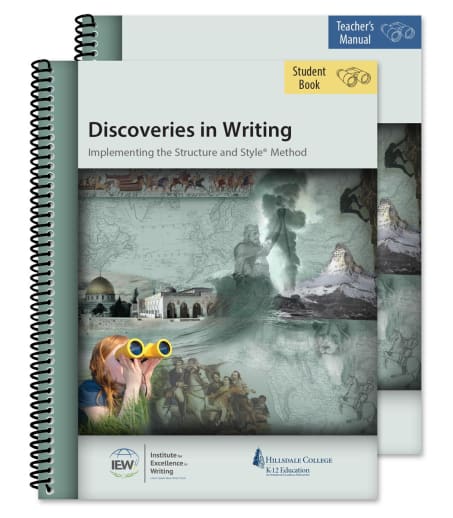This combo package includes the required components for this course: reusable spiral-bound teacher text and consumable spiral student. See individual component descriptions for more details. Accompanying PDF downloads (reproducible checklists, vocabulary cards, and exemplars) are available for free with the purchase of these books (download instructions included in each text). This course is the second in a series of multi-theme courses created in conjunction with Hillsdale’s K-12 American Classical Education topics of scope and sequence, which assigns a Grade 4 reading level to this course. First edition ~ Ruth
Discoveries in Writing (Teacher/Student Combo)
Product Overview
- Aligns with Hillsdale College’s suggested topics
- Full course components needed to apply Structure and Style® method
- Full year of composition instruction with a 4-day per week schedule
- Optional suggested literature package available
Description
Discover a wide variety of fascinating subjects in Discoveries in Writing! In this theme-based writing curriculum, students write about exciting topics such as the Bayeux Tapestry, tsunamis, Jerusalem and the Crusades, and other interesting subjects while they learn to write with the Structure and Style® writing method. Offering a full year of instruction for students in 4th grade, these lessons cover seven of the nine IEW Units. Literature suggestions and access to vocabulary
cards and other helpful PDF downloads are included. Purchase the Teacher’s Manual and Student Book together and save!
This book is designed to be used by an instructor who has been through or is currently viewing the Teaching Writing: Structure and Style video course.
Jaunt out to discover our world and the world of writing with this theme-based writing curriculum. Students will explore source texts on topics from Alfred the Great to the Bayeux Tapestry, from Mecca to Jerusalem and the Crusades, from Lafayette to The French and Indian War, and more. The 30-lesson course helps students learn and practice how to write from notes, retell stories, summarize references, write from pictures, and use their imagination. This curriculum assumes teachers have learned the methodology of and have access to the IEW program, Teaching Writing: Structure and Style, which will be referenced in each unit. Twenty-three lessons introduce vocabulary words (such as miraculously, ambush, characteristic, and reconciliation) which is practiced regularly, with periodic quizzes (with the intent of incorporating these words in their writing assignments). To teach the course, purchase the combo, or as individual pieces. This course is the second in a series of multi-theme courses created in conjunction with Hillsdale’s K-12 American Classical Education topics of scope and sequence, which assigns a Grade 4 reading level to this course. Literature recommendations can be scheduled to supplement the curriculum (including Treasure Island, King Arthur and the Round Table, Robin Hood, Johnny Tremain, Anne of Green Gables, and some folktales and stories). First edition ~ Ruth
| Product Format: | Other |
|---|---|
| Grades: | 3-5 |
| Brand: | Institute for Excellence in Writing |
| ISBN: | 9781623414061 |
| Length in Inches: | 11 |
| Width in Inches: | 9.625 |
| Height in Inches: | 1.25 |
| Weight in Pounds: | 2.9 |

